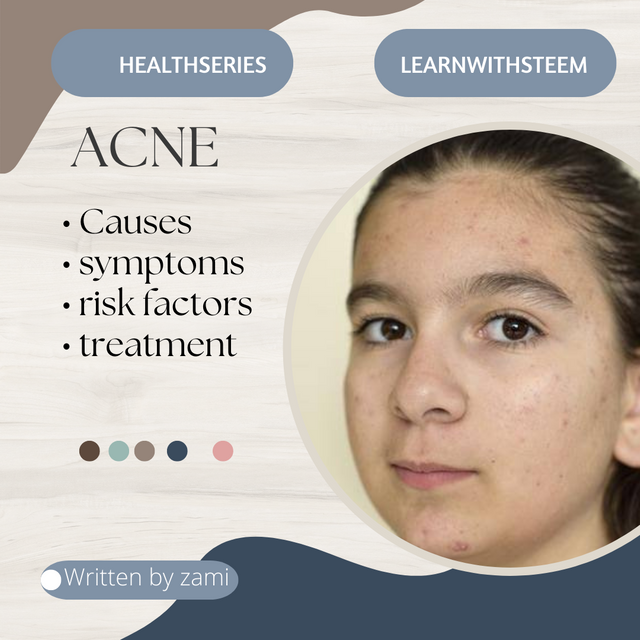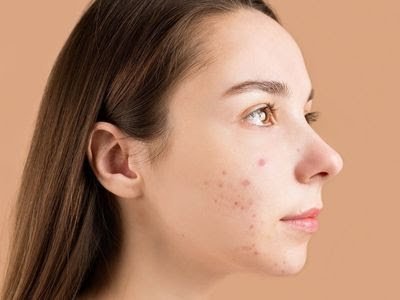Health series: Acne; Symptoms, causes, risk factors, diagnosis and treatment.

Image create on canva
Greetings to everyone, hope you all are doing amazingly well. Its been a while I made a post on the health series, that's because I took some time off as I was severely ill, thank God I'm fully recovered now and back to doing what I enjoy most.
So today, I'll be writing about a common skin infection, it generally doesn't pose a serious threat, but can make one feel very uncomfortable especially in severe cases, the name of this skin infection is known as Acne.
what is acne
Acne is an inflammation of the skin characterised by pimples or zit. It occurs when the tiny holes on the face called hair follicles is blocked either by oil, dirt or dead skin cell. This results in the onset of acne.
According to world health organisation (WHO) statistics, about 9.4 percent of people globally have acne, this makes it the most common skin condition in the world. Acne can sometimes be painful especially in severe cases, it can also lead to feelings of anxiety and depression.
Symptoms of acne
The symptoms of acne varies depending on the severity of the condition and the individual involved. Acne usually breakout on the face, chest, upper back and shoulders.
The symptoms include;
- Small red, tender bumps (papules)
- pus filled lumps under the skin
- pimples (pustules)
- painful solid lumps (nodules)
- blackhead (open plugged pores)
- whiteheads (closed pugged pores)
- skin discolouration (hyperpigmentation)
- scaring of the face.
Causes of acne
Acne occurs when the tiny pores on the skin is blocked by oil, dirt or dead skin cell. Each pore on the skin opens to the follicle which consist of hair and sebaceous (oil) gland when the follicles becomes blocked or produces too much oil, acne ensues. The sebaceous gland naturally produces oil that helps lubricate the skin, when this oil becomes excess, it can result in acne.
Further more, some other factors can also trigger acne break out
They include;
- hormonal changes
- certain medications, e.g steroids
- consumption of carbohydrate rich food like bread and chips.
Risk factors
Some of the risk factors associated with acne include;
- polycystic ovarian syndrome (PCOS)
- Cigarette smoking
- poor sleep
- family history of acne
- probiotics
- Excess fatty acid
- Applying friction on the skin
- puberty
Diagnosis
Acne is usually diagnosed by a dermatologist or a qualified health personnel after sessions of physical examination. This is done to ascertain the type and severity of the lession.
When an individual is diagnosed of acne, he or she should resist the urge to squeezing the pustules no matter how tempting it might be.
Treatment
Treatment approach depends on severity of the acne.
For moderate to severe acne, topical medications like tretinoin (retin A), clindamycin and benzoyl peroxide are first line treatment. Oral antibiotics like oxytetracyclin and erythromycin can also be included in the therapy to aid in fast relieve of the infection.
Conclusion
Acne is a very common skin condition around the globe, almost all household have at least one case of acne.
Acne is not contagious, but can be passed down to close relatives based on the family history.
If you suspect an acne breakout on your skin, meet an health care provider to ascertain the severity and proffer the right medications for it.

Congratulations, your post has been supported by @steem4nigeria. This is the official community account of Nigerians on Steemit. You can reach us here on our community account.
Discord Facebook Twitter